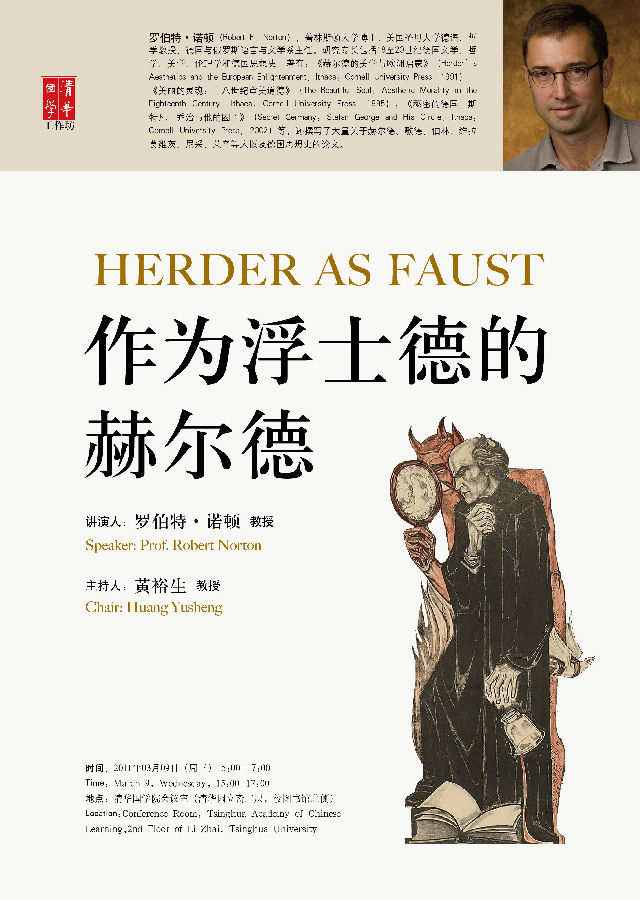
清华大学国学研究院主办
题 目:作为浮士德的赫尔德(Herder as Faust)
讲演人:罗伯特•诺顿(Robert E. Norton) 教授
主持人 黄裕生教授
时 间:2011年03月09日(周三)下午3:00–5:00
地 点:清华国学院会议室(清华园立斋二层,校图书馆北侧)
讲演者
罗伯特•诺顿(Robert E. Norton),普林斯顿大学博士,美国圣母大学德语、哲学教授,德国与俄罗斯语言与文学系主任。他的研究专长包括18至20世纪德国文学、哲学、美学、伦理学和德国思想史。著有:《赫尔德的美学与欧洲启蒙》(Herder’s Aesthetics and the European Enlightenment, Ithaca: Cornell University Press, 1991);《美丽的灵魂:十八世纪审美道德》(The Beautiful Soul: Aesthetic Morality in the Eighteenth Century, Ithaca: Cornell University Press, 1995);《秘密的德国:斯特凡•乔治与他的圈子》(Secret Germany: Stefan George and His Circle, Ithaca: Cornell University Press, 2002)等,此外还撰写了大量关于赫尔德、歌德、乔治、伯林、维拉莫维茨、尼采、莱辛等人以及德国思想史的论文。
讲演内容
赫尔德(Johann Gottfried Herder,1744-1803)是近代德国文化史、思想史中的重要人物之一,他在神学、史学、美学、文学、语言学及认识论等方面都有卓识。1770年赫尔德在斯特拉斯堡会见了年轻的歌德,这次经历在艺术和文学创作上对后者产生了深远影响;几年后,歌德创作了著名的戏剧《浮士德》,长久以来,赫尔德被认为是该戏主角浮士德的原型。不过,罗伯特•诺顿教授却认为,与其说在事实上赫尔德启发了歌德的创作,毋宁说是后来的思想家们对赫尔德的阐释方式,造就了这一理解,他们认为赫尔德在独特的德国文化史中有着重要的地位,而该文化在斯宾格勒的《西方的衰落》一书中被称为“浮士德文化”。这一阐释方式认为,赫尔德开创了某种独特的、至少是和欧洲其他国家截然有别的思维风格;这样的理解,则对二十世纪前半叶德国的自我认识产生了深远且有害的影响。
Johann Gottfried Herder (1744-1803) has played a crucial role in modern German cultural and intellectual history. For one, he was an extraordinarily prolific polymath who he wrote important and influential works on theology, history, aesthetics, linguistics, literature and epistemology. Too, his encounter with Johann Wolfgang Goethe, who was five years his junior, while they were both in Strasbourg in 1770 was a decisive moment in the younger poet's development. It has even been argued that Herder served as the first living model for the scholarly figure of Faust in the drama Goethe began to write a few years after their meeting. However, in my talk I will consider not so much the connection between Herder and Goethe's play, but rather the way in which later German thinkers interpreted Herder's significance in the evolution of a distinctly German culture, a culture that Oswald Spengler, for instance, famously called "Faustian" in his epoch-making book The Decline of the West. For it was this interpretation--positing Herder as the origin of a style of thinking that was fundamentally at odds with, or at least substantially different from, that in the rest of Europe--which came to have a profound and deleterious effect on German self-understanding during the first half of the twentieth century.

